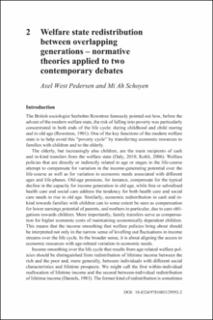| dc.contributor.author | Pedersen, Axel West | |
| dc.contributor.author | Schøyen, Mi Ah | |
| dc.date.accessioned | 2022-01-28T12:49:15Z | |
| dc.date.available | 2022-01-28T12:49:15Z | |
| dc.date.created | 2021-09-25T09:54:46Z | |
| dc.date.issued | 2021-09-13 | |
| dc.identifier.isbn | 978-0-367-65471-9 | |
| dc.identifier.isbn | 978-0-367-65475-7 | |
| dc.identifier.isbn | 978-1-003-12959-2 | |
| dc.identifier.uri | https://hdl.handle.net/11250/2939385 | |
| dc.description.abstract | In this chapter, we discuss theoretical approaches to justice in relation to economic distribution and redistribution across age groups, and we explore their implications for current debates in the domains of pension policy and family policy. We take as our point of departure two competing theories about distributive justice in relation to age groups/overlapping generations: the first has been most distinctly formulated by Norman Daniels, who argues that inequality in the distribution of resources across individuals in different age groups/life-phases can be justified as long as they contribute to the goal of maximising individual welfare in a lifetime perspective. The alternative theory, advanced by Dennis McKerlie in particular, insists on securing equality in the distribution of economic wellbeing between individuals in different age groups at any given point in time. We apply these two theories to two topical issues in contemporary Norwegian welfare policy: (a) the conversion of the implicit generational contract in connection with the major pension reform that was enacted in 2009 and (b) the gradual transformation of the package of economic support for families with children away from cash transfers (child allowance) and over to free or subsidised services (childcare and after school recreational programmes). We show how these policy debates can be interpreted in terms of the two theoretical perspectives and suggest some policy implications that might follow from an attempt to flesh out a reasonable compromise. | en_US |
| dc.description.sponsorship | Open Access funding provided by NOVA, OsloMet | en_US |
| dc.language.iso | eng | en_US |
| dc.publisher | Routledge | en_US |
| dc.relation.ispartof | Generational Tensions and Solidarity Within Advanced Welfare States | |
| dc.rights | Attribution-NonCommercial-NoDerivatives 4.0 Internasjonal | * |
| dc.rights.uri | http://creativecommons.org/licenses/by-nc-nd/4.0/deed.no | * |
| dc.subject | Welfare state | en_US |
| dc.subject | Redistribution policies | en_US |
| dc.title | Welfare state redistribution between overlapping generations – normative theories applied to two contemporary debates | en_US |
| dc.type | Chapter | en_US |
| dc.type | Peer reviewed | en_US |
| dc.description.version | publishedVersion | en_US |
| dc.rights.holder | © 2022 individual chapters, the contributors | en_US |
| cristin.ispublished | true | |
| cristin.fulltext | original | |
| cristin.qualitycode | 2 | |
| dc.identifier.doi | https://doi.org/10.4324/9781003129592 | |
| dc.identifier.cristin | 1938508 | |
| dc.relation.project | Norges forskningsråd: 270874 | en_US |

